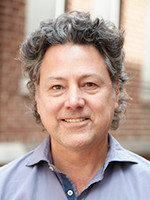Obayashi PrizeRecipient of the Ninth Obayashi Prize
(2016)
Mr. Alejandro ECHEVERRIArchitect

Professor Echeverri is a Colombian architect born in Medellin. Alejandro believes in the ethical responsibility of designers with our cities in contributing towards a better society. His focus has been in leading multidisciplinary teams whose work focuses in emergent territories that present high informality, exclusion and inequity, immersed in complex and unstable realities. His main interest and focus has been the development of processes with architectural or urban projects as the backbone for social and territorial development, which, through innovation in the instruments used, develops a flexible and holistic ecosystem that involves building connections with governments, institutions and the community. His work has achieved a great deal of innovation and creativity, with design as a constant learning process.
Between 2004 to 2008, as general manager of the Empresa de Desarrollo Urbano and then as the city’s director of urban projects, he led the Social Urbanism strategy to improve the most impoverished neighborhoods, with the support and partnership of the city’s mayor Sergio Fajardo, making Medellin a blueprint for the future for other distressed cities worldwide.
Since 2010, and as its head founder, he is the director of URBAM, the Center for Urban and Environmental Studies of EAFIT University. Urbam delves into the urban, environmental and social issues of emerging developing countries, particularly those with weak political and institutional structures, and currently is involved in an ongoing collaboration projects with the Action Cities Network. He is also active in design through his studio, Alejandro Echeverri + Valencia Arquitectos, focusing on projects with low environmental impact.
His work has earned the Colombian National Architectural Award SCA in 1996, the Pan-American Biennale in Urban Design Award 2008, the Curry Stone Design Prize in 2009, the 10th Veronica Rudge Green Prize in Urban Design from Harvard in 2013, among others.
Reasons for Award
Professor Alejandro Echeverri played a central role in a bold public program to regenerate the city of Medellin, Colombia, which was then known as the most dangerous city in the world, with slums occupying 70 percent of the urban area, and a homicide rate of 381 per 100,000 inhabitants. The program, which was implemented between 2004 and 2008 by Sergio Fajardo, the city’s mayor at the time, set out to improve opportunities for education as a key to reviving the city, and sought to apply the philosophy that the most beautiful buildings must be in the city’s poorest areas, in order to inspire hope and develop a sense of community in areas of the city that had long been treated as a lost cause. As the city’s director of urban projects, Professor Echeverri demonstrated great insight as an architect and outstanding leadership in the pursuit of various initiatives, including the construction of cable cars and outdoor escalators to connect the slum areas with the city metro system, and the development of five library parks, museums, and other facilities in the impoverished areas by distinguished architects. These new facilities provide the residents of the impoverished neighborhoods with places and opportunities to learn, while the improved access to and from the city center has both increased their opportunities for employment and helped to ensure that residents from other districts and tourists also visit such neighborhoods. These projects contributed significantly to reforming and reviving Medellin by resolving issues of poverty and conflict, fostering a sense of community among local residents, and curbing crime.
Following the improvements achieved through the program, in 2013 Medellin topped New York and Tel Aviv to be crowned “Innovative City of the Year” in a contest organized by the Wall Street Journal and Citigroup.
By applying bold approaches and successfully working with a number of collaborators, Professor Echeverri pursued a comprehensive urban redevelopment program spanning areas such as education, construction, transport, culture, and welfare, and his earnest efforts produced significant results in tackling the numerous issues facing the city, including poverty, conflict, crime, and alienation. These achievements are consistent with the principles and aims upon which this foundation was established, and are worthy of being awarded the Obayashi Prize.


